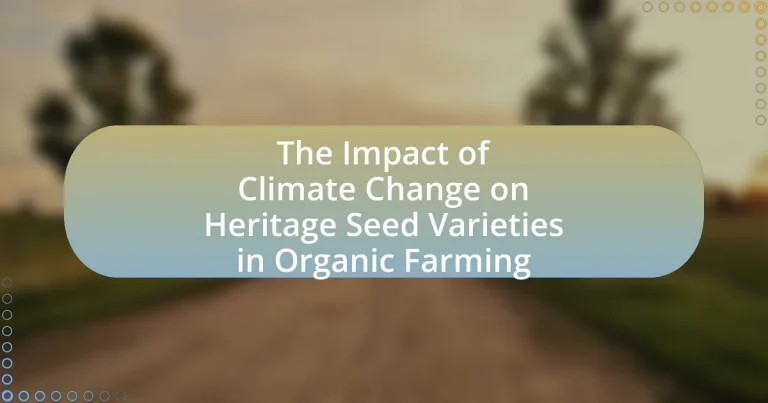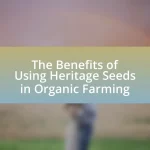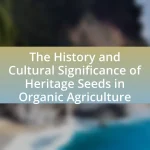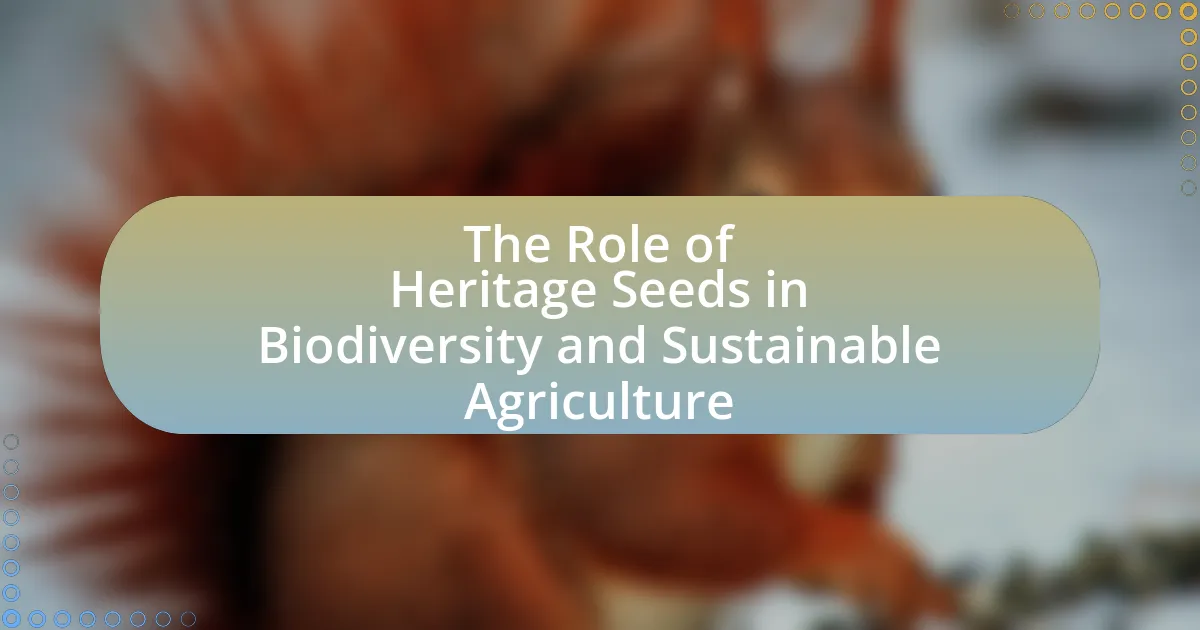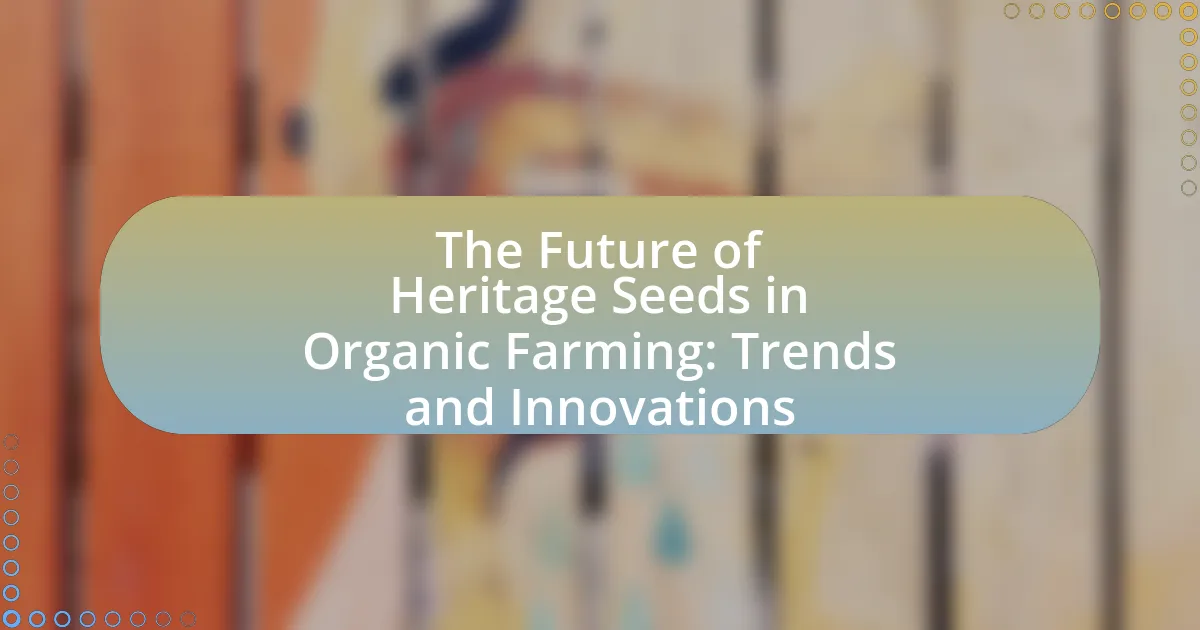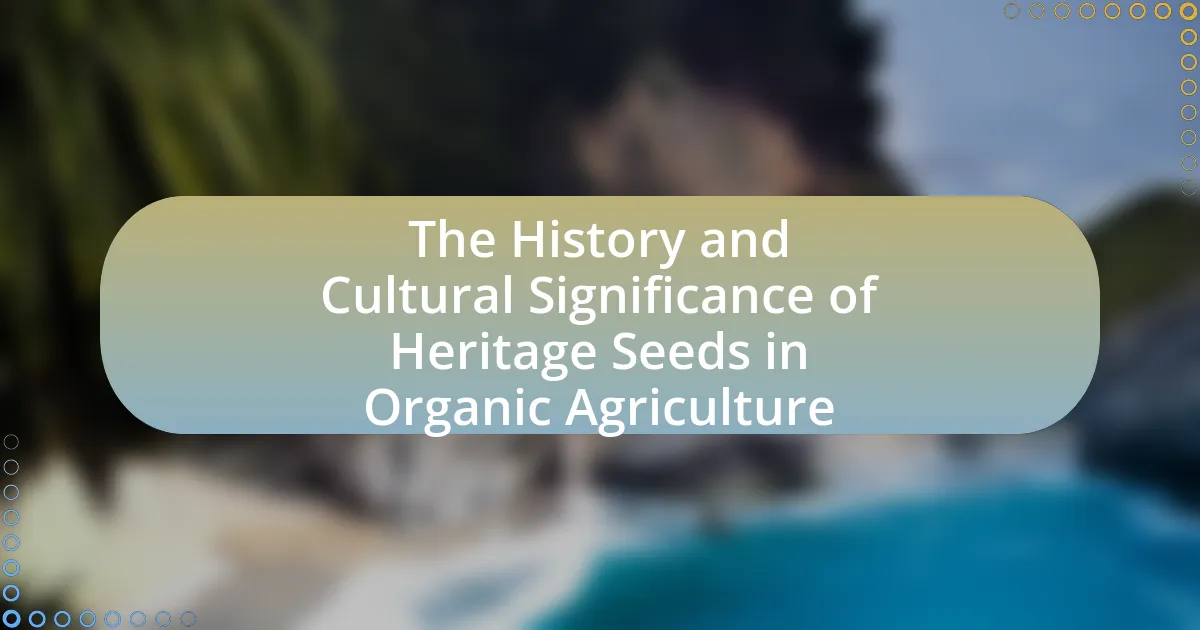The article examines the impact of climate change on heritage seed varieties within organic farming, highlighting how altered growing conditions lead to reduced yields and biodiversity loss. It discusses specific climate factors such as temperature, precipitation, and extreme weather events that threaten the survival of these traditional seeds, which are crucial for maintaining genetic diversity and sustainable agricultural practices. The article also addresses the challenges organic farmers face due to climate change, including increased pest pressures and shortened growing seasons, while outlining strategies for preserving heritage seeds and enhancing their resilience through breeding techniques and supportive policies.
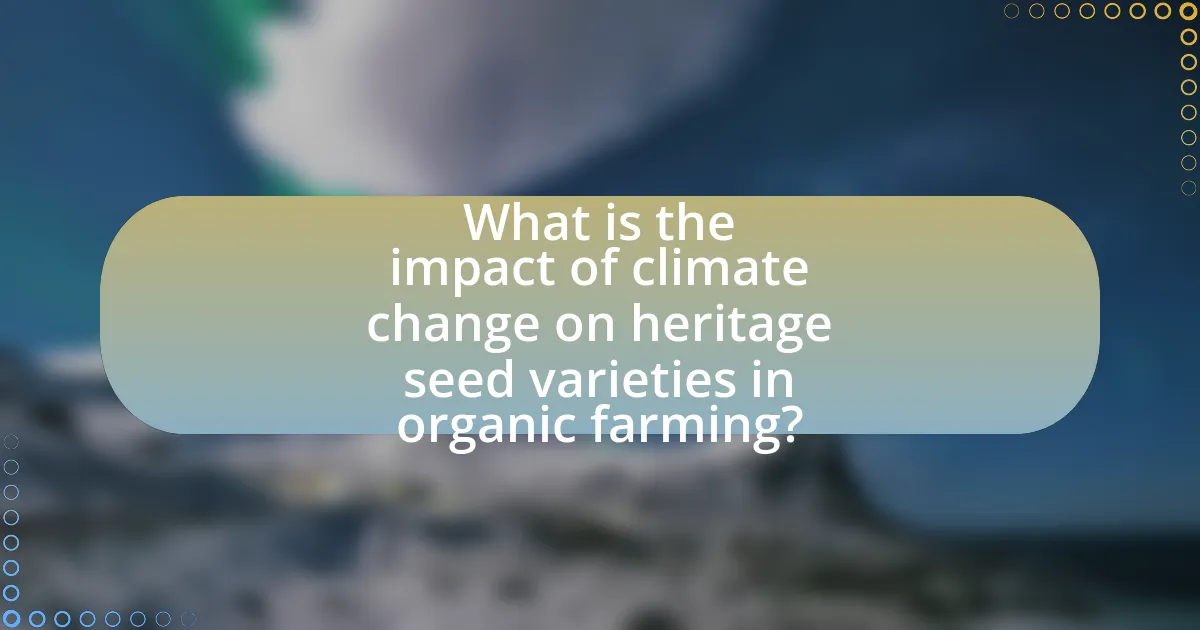
What is the impact of climate change on heritage seed varieties in organic farming?
Climate change negatively impacts heritage seed varieties in organic farming by altering growing conditions, which can lead to reduced yields and biodiversity loss. Increased temperatures, altered precipitation patterns, and more frequent extreme weather events stress these traditional varieties, making them less resilient. For instance, a study published in the journal “Agricultural Systems” found that climate change could reduce the viability of certain heritage seeds by up to 30% in specific regions, threatening their cultivation and the genetic diversity they provide. This decline in heritage seed varieties undermines organic farming practices that rely on biodiversity for sustainable agriculture.
How does climate change affect the biodiversity of heritage seed varieties?
Climate change negatively impacts the biodiversity of heritage seed varieties by altering environmental conditions such as temperature, precipitation, and soil health. These changes can lead to reduced genetic diversity as certain varieties may not adapt quickly enough to shifting climates, resulting in decreased resilience against pests, diseases, and extreme weather events. For instance, a study published in the journal “Agricultural Systems” highlights that heritage seeds, which often have specific growing requirements, may face extinction if their environmental conditions are no longer suitable, thereby threatening the genetic pool essential for sustainable agriculture.
What specific climate factors influence the survival of heritage seed varieties?
Specific climate factors that influence the survival of heritage seed varieties include temperature, precipitation patterns, humidity, and extreme weather events. Temperature affects germination rates and growth cycles; for instance, many heritage varieties are adapted to specific temperature ranges, and deviations can hinder their development. Precipitation patterns determine soil moisture availability, which is crucial for seed viability and crop yield; irregular rainfall can lead to drought or flooding, both detrimental to heritage seeds. Humidity levels impact disease prevalence, as higher humidity can promote fungal infections that threaten seed health. Extreme weather events, such as storms or heatwaves, can cause physical damage to crops and disrupt growing conditions, further jeopardizing the survival of these varieties.
How does the loss of biodiversity impact organic farming practices?
The loss of biodiversity negatively impacts organic farming practices by reducing the variety of crops and beneficial organisms available for cultivation. This decline in diversity can lead to increased vulnerability to pests and diseases, as a narrower genetic pool limits the resilience of crops. For instance, studies have shown that diverse ecosystems can enhance pest control and pollination services, which are crucial for organic farming success. Additionally, the loss of native plant species can disrupt soil health and nutrient cycling, further compromising organic farming systems that rely on ecological balance.
Why are heritage seed varieties important for organic farming?
Heritage seed varieties are important for organic farming because they promote biodiversity and resilience in agricultural systems. These seeds are often well-adapted to local climates and conditions, which enhances their ability to thrive in the face of climate change. Research indicates that heritage varieties can offer greater resistance to pests and diseases, reducing the need for chemical inputs, which aligns with organic farming principles. Additionally, heritage seeds contribute to the preservation of genetic diversity, which is crucial for food security and sustainable agriculture. Studies have shown that diverse cropping systems can improve soil health and increase yields, making heritage seeds a vital component of organic farming practices.
What unique traits do heritage seed varieties offer to organic farmers?
Heritage seed varieties offer unique traits to organic farmers, including genetic diversity, adaptability to local conditions, and resilience against pests and diseases. These traits stem from their long history of cultivation, which has allowed them to develop characteristics that enhance their survival and productivity in specific environments. For instance, studies have shown that heritage varieties often possess traits such as drought resistance and improved flavor profiles, which can be crucial for organic farming practices that prioritize sustainability and quality. Additionally, the genetic diversity found in heritage seeds can help organic farmers maintain crop stability in the face of climate change, as these varieties are more likely to thrive under varying environmental conditions.
How do heritage seed varieties contribute to sustainable agriculture?
Heritage seed varieties contribute to sustainable agriculture by promoting biodiversity and resilience in farming systems. These seeds are often well-adapted to local climates and conditions, which enhances their ability to withstand environmental stresses such as drought or pests. Research indicates that heritage varieties can yield better results in organic farming systems, as they often require fewer chemical inputs and are more resistant to diseases, thereby reducing the ecological footprint of agriculture. For instance, a study published in the journal “Agriculture, Ecosystems & Environment” found that farms using heritage seeds had a 20% higher biodiversity index compared to those using commercial hybrids, demonstrating their role in maintaining ecosystem health.
What challenges do organic farmers face due to climate change?
Organic farmers face several challenges due to climate change, including increased pest pressures, altered growing seasons, and reduced biodiversity. These challenges arise as rising temperatures and shifting precipitation patterns create favorable conditions for pests and diseases that threaten organic crops. For instance, studies indicate that warmer temperatures can lead to earlier pest emergence, which disrupts the natural pest management strategies that organic farmers rely on. Additionally, climate change can shorten the growing season for certain heritage seed varieties, making it difficult for farmers to produce viable yields. Research from the Intergovernmental Panel on Climate Change highlights that these factors can lead to decreased crop resilience and increased reliance on external inputs, undermining the principles of organic farming.
How does climate change affect crop yields in organic farming?
Climate change negatively affects crop yields in organic farming primarily through increased temperatures, altered precipitation patterns, and the prevalence of pests and diseases. Higher temperatures can lead to heat stress in plants, reducing their growth and productivity. For instance, studies indicate that a 1°C increase in temperature can decrease yields of staple crops like wheat and maize by 6-10%. Additionally, changes in rainfall patterns can result in droughts or flooding, both of which can severely impact soil health and crop viability. Furthermore, climate change can exacerbate pest and disease outbreaks, as warmer conditions may expand the range and lifecycle of harmful organisms, further threatening organic crop yields.
What strategies can organic farmers adopt to mitigate these challenges?
Organic farmers can adopt crop diversification as a primary strategy to mitigate the challenges posed by climate change on heritage seed varieties. By planting a variety of crops, farmers can enhance resilience against climate variability, pests, and diseases, which are exacerbated by changing weather patterns. Research indicates that diversified systems can improve soil health and increase yields, as seen in studies conducted by the Rodale Institute, which found that diverse crop rotations can lead to a 20% increase in overall productivity compared to monocultures. Additionally, implementing agroecological practices, such as cover cropping and reduced tillage, can further enhance soil fertility and moisture retention, making heritage varieties more adaptable to climate stressors.
How can heritage seed varieties adapt to changing climate conditions?
Heritage seed varieties can adapt to changing climate conditions through their genetic diversity, which allows for resilience against environmental stresses. This genetic variability enables these seeds to thrive in a range of conditions, such as drought, heat, and pests, which are becoming more prevalent due to climate change. For instance, studies have shown that heritage varieties often possess traits that enhance their ability to withstand extreme weather, such as deeper root systems that access moisture during dry spells. Additionally, the traditional cultivation practices associated with heritage seeds, such as crop rotation and intercropping, further support their adaptability by promoting soil health and biodiversity.
What breeding techniques can enhance the resilience of heritage seed varieties?
Breeding techniques that can enhance the resilience of heritage seed varieties include selective breeding, crossbreeding, and the use of marker-assisted selection. Selective breeding focuses on choosing parent plants with desirable traits, such as drought tolerance or disease resistance, to produce offspring that inherit these beneficial characteristics. Crossbreeding involves combining different heritage varieties to create hybrids that may exhibit improved resilience to environmental stresses. Marker-assisted selection utilizes molecular markers to identify and select plants with specific genetic traits linked to resilience, allowing for more precise breeding outcomes. These techniques have been shown to improve the adaptability of heritage seed varieties in changing climates, as evidenced by studies demonstrating increased yields and survival rates under stress conditions.
How can farmers select the best heritage seeds for their specific climate conditions?
Farmers can select the best heritage seeds for their specific climate conditions by assessing local climate data, soil types, and historical crop performance. This involves analyzing temperature ranges, precipitation patterns, and frost dates to identify seed varieties that have thrived in similar environments. For instance, research indicates that heritage varieties often possess traits such as drought resistance or cold hardiness, which can be crucial for adapting to changing climate conditions. Additionally, farmers can consult local agricultural extension services or seed banks that provide information on heritage seeds suited to their region, ensuring that the selected seeds are well-adapted to the specific challenges posed by climate change.
What role do policies play in supporting heritage seed varieties in organic farming?
Policies play a crucial role in supporting heritage seed varieties in organic farming by providing legal frameworks, funding, and incentives that promote biodiversity and sustainable agricultural practices. For instance, regulations that protect traditional seed varieties from patenting encourage farmers to cultivate and preserve these seeds, ensuring genetic diversity. Additionally, government programs often offer financial support for organic farmers who choose to grow heritage varieties, which can enhance their marketability and resilience against climate change impacts. Research indicates that countries with supportive seed policies, such as those in the European Union, have seen increased adoption of heritage seeds, contributing to both ecological sustainability and food security.
How can government initiatives promote the preservation of heritage seeds?
Government initiatives can promote the preservation of heritage seeds by implementing policies that support seed banks and conservation programs. For instance, funding for research and development of heritage seed varieties can enhance genetic diversity and resilience against climate change. Additionally, governments can establish legal frameworks that protect traditional farming practices and incentivize farmers to cultivate and maintain heritage seeds, thereby ensuring their continued use and availability. Evidence from the Food and Agriculture Organization indicates that countries with supportive policies for seed conservation have seen increased biodiversity and improved food security, demonstrating the effectiveness of such initiatives.
What are the implications of agricultural policies on organic farming practices?
Agricultural policies significantly influence organic farming practices by shaping regulations, funding, and market access. For instance, policies that promote sustainable practices can enhance organic farming by providing financial incentives and technical support, which encourages farmers to adopt organic methods. Conversely, restrictive policies, such as stringent certification requirements or limited access to organic inputs, can hinder the growth of organic farming. According to the USDA’s National Organic Program, the number of certified organic farms in the U.S. increased from 14,000 in 2000 to over 88,000 in 2021, demonstrating how supportive policies can foster organic agriculture. Thus, the implications of agricultural policies are critical in determining the viability and expansion of organic farming practices.
What practical steps can organic farmers take to preserve heritage seed varieties?
Organic farmers can preserve heritage seed varieties by implementing seed saving practices, which involve collecting and storing seeds from their best-performing plants. This method ensures genetic diversity and maintains the unique traits of heritage varieties. Additionally, farmers can establish seed banks to safeguard these seeds against climate change impacts, as demonstrated by the Svalbard Global Seed Vault, which houses over a million seed samples from around the world. Furthermore, organic farmers can engage in community seed exchanges to promote the sharing of heritage varieties, thereby enhancing local biodiversity and resilience. These steps are crucial for maintaining the agricultural heritage and adapting to changing environmental conditions.
How can farmers implement seed saving practices effectively?
Farmers can implement seed saving practices effectively by selecting and preserving seeds from the best-performing plants in their fields. This involves identifying plants that exhibit desirable traits such as disease resistance, drought tolerance, and high yield, and then collecting seeds from these plants at the appropriate time to ensure genetic quality. Research indicates that seed saving can enhance biodiversity and resilience in crops, which is crucial in the context of climate change impacting heritage seed varieties. For instance, a study published in the journal “Agriculture, Ecosystems & Environment” highlights that farmers who engage in seed saving contribute to the preservation of local genetic resources, which can adapt better to changing environmental conditions.
What resources are available for farmers to learn about heritage seed preservation?
Farmers can access various resources to learn about heritage seed preservation, including agricultural extension services, online courses, and community seed banks. Agricultural extension services provide localized information and support, often offering workshops and seminars on seed saving techniques. Online platforms like Seed Savers Exchange and the Organic Seed Alliance offer educational materials, guides, and webinars focused on heritage seed preservation. Community seed banks not only serve as repositories for heritage seeds but also often conduct educational programs to teach farmers about the importance and methods of preserving these seeds. These resources collectively support farmers in maintaining biodiversity and adapting to climate change impacts on organic farming.
